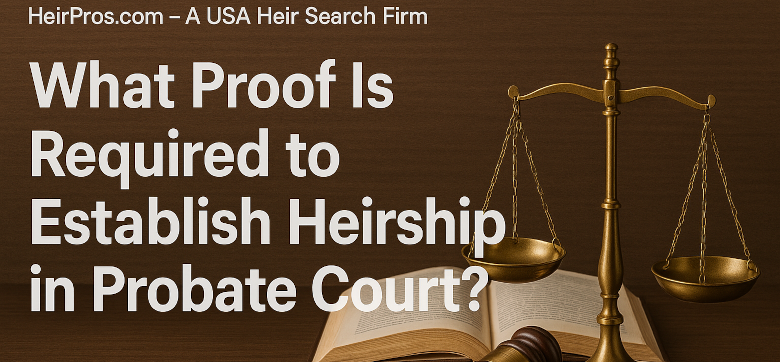Jump to Section
Summary
Establishing heirship in probate court is a crucial aspect of estate management, particularly when dealing with intestate succession. This article outlines the types of proof required to determine legal heirs, addresses common challenges faced during the process, and offers a step-by-step approach for attorneys navigating these intricacies. With insight into frequently asked questions and expert tips, professionals can better serve their clients in resolving estate distribution matters efficiently.
Overview
Understanding the proof required to establish heirship in probate court is essential for lawyers and estate planners. When a person dies intestate (without a will), the court must determine who the legal heirs are. This process can be complicated and often requires substantial documentation.
Key Types of Proof
- Birth certificates
- Marriage certificates
- Death certificates of prior family members
- Wills (if available)
- Affidavits of heirship
- Historical records documenting family relationships
Common Challenges
There are several challenges that attorneys may encounter when establishing heirship:
- Insufficient or missing documentation
- Disputes among potential heirs
- Complex family dynamics (e.g., blended families)
- Legal discrepancies in state laws
Step-by-Step Process
Here’s a comprehensive step-by-step process to establish heirship effectively:
- Gather all relevant documentation proving family relationships.
- Consult state laws regarding intestate succession, as these laws can differ.
- File a petition for probate in the appropriate court.
- Submit evidence of heirship along with your petition.
- Attend the hearing to present your case before the judge.
- Address any objections and provide additional evidence if needed.
- Receive the court’s determination on heirship.
FAQs
What documents do I need to prove someone is an heir?
You typically need birth and marriage certificates, death certificates, and possibly affidavits of heirship.
Can a will override state intestacy laws?
Yes, a valid will can dictate the distribution of an estate, negating intestacy laws.
How long does the probate process take for establishing heirship?
The timeline can vary but often takes several months due to the complexity of each case.
What happens if there are competing claims for heirship?
In such cases, the court may require further evidence and may even hold a hearing to resolve disputes.
Expert Tips
To enhance your success in establishing heirship, consider these expert tips:
- Thoroughly prepare your documentation in advance.
- Maintain open communication with all parties involved to reduce conflicts.
- Familiarize yourself with the specific state laws where the probate is being filed.
- Consider consulting with professional heir search services, such as those offered at HeirPros.com.
Related Resources
For further reading on the probate process, visit the National Law Online for comprehensive advice and legal guidelines regarding heirship and probate matters.




